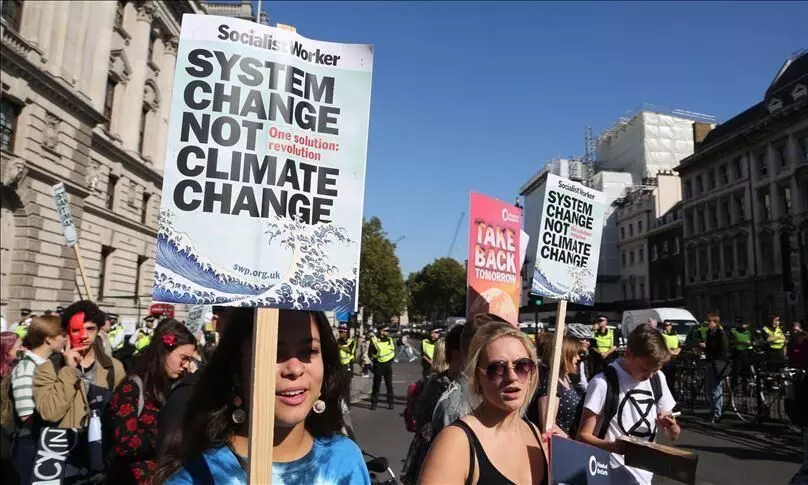
14.5mn lives under death threat by 2050 due to climate crisis: WEF
text_fieldsDavos: The World Economic Forum warned on Tuesday that climate change-induced disasters may lead to 14.5 million deaths and USD 12.5 trillion in economic losses, PTI reported.
But, it said, there is still time for global stakeholders to take decisive and strategic action to counter these forecasts and mitigate the health impacts of climate change globally.
The report Quantifying the Impact of Climate Change on Human Health, developed in collaboration with Oliver Wyman, was released at the World Economic Forum Annual Meeting 2024.
It analysed the climate crisis through a new lens by providing a detailed picture of the indirect impact climate change will have on human health, the global economy and healthcare systems around the world.
"While there has been much discussion about the impact of climate change on nature and the global economy, some of the most pressing consequences of the Earth's rising temperatures will be on human health and the global healthcare system," said Shyam Bishen, Head of the Centre for Health and Healthcare and Member of the Executive Committee at the WEF.
"Recent progress will be lost unless critical emission reduction and mitigation measures are improved, and decisive global action is taken to build climate resilient and adaptable health systems," he added.
The analysis is based on scenarios developed by the Intergovernmental Panel on Climate Change (IPCC) on the most likely trajectory for the planet's rising average temperature, 2.5 degrees to 2.9 degrees Celsius over pre-industrial levels.
The report analysed six major climate-driven event categories as key multi-pronged drivers of negative health impacts -- floods, droughts, heat waves, tropical storms, wildfires and rising sea levels.
Floods were found to pose the highest acute risk of climate-induced mortality, accounting for 8.5 million deaths by 2050.
Droughts, indirectly linked to extreme heat, are the second-highest cause of mortality, with an anticipated 3.2 million deaths.
Heat waves will take the highest economic toll, at an estimated USD 7.1 trillion by 2050, due to the loss in productivity.
Excess deaths attributed to air pollution, caused by fine particulate and ozone pollution, are expected to be the largest contributor to premature death, with almost 9 million deaths a year.
Climate change will also trigger a catastrophic rise across several climate-sensitive disease outcomes, including vector-borne disease, which will likely impact previously less affected regions, such as Europe and the United States, the WEF said.
By 2050, an additional 500 million people may be at risk of exposure to vector-borne diseases, the report finds.
"The climate crisis is a health crisis, and it is driving a vicious cycle of disease, economic devastation and suffering. It is clear from this report that we are still to understand the full impact," said Vanessa Kerry, CEO of Seed Global Health and WHO Special Envoy for Climate Change and Health.
"If we fail to act, not only will the death toll be staggering, but we also risk losing progress made over decades to improve health outcomes around the world. Countries least able to afford these shocks and who contribute the least to global emissions will be impacted the most," she added.
The report warned that climate change will further entrench global health inequities, with the most vulnerable populations, including women, youth, elderly, lower-income groups and hard-to-reach communities, the most affected.












